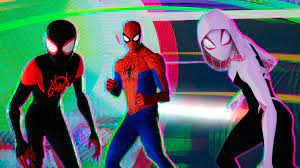Watching Animated Movies Doesn’t Make You Childish

October 19, 2022
Are you about 15+ and still watching animated PG movies by yourself? Do all your friends and family make fun of you for watching animated films like Finding Nemo or Shrek? Well then, you’re not alone. In society today, anyone of a certain age is told to watch anything rated for more mature audiences, leading them to leave a sense of childhood behind.
For those who watch PG movies, they are just considered childish and simple. In reality, some people just enjoy something that is a change of pace from all the vulgar language, blood, guns, drugs, and sexual content. They have fun watching something appealing and enjoyable that looks beautiful whenever you look at it. I remember playing a Kahoot a week ago and almost no one could guess any Disney character without additional help from another classmate. It honestly hurts me that people can’t remember iconic characters like Tiana from Princess and the Frog or Squirt from Finding Nemo, movies that they call childish.
This avoidance of animated movies stems from the fact that people don’t want to do anything that will make them seem “weird” to their peers. Even if someone does watch anything that was produced for a younger audience, they will try to hide the fact that they do. And as a result, they hold a piece of themselves back from being comfortable with something that they enjoy doing. Some even hide behind the excuse of “I watched it with my little sibling/cousin, but that’s about it” to lead people to believe that they watched it under family circumstances.
This can also be blamed on the living environment of a child. There are children that have been known to watch rated R movies at the age of 10, which generally makes them experience more mature and adult content that makes them believe they are more mature and evolved than others their age. For example, back in 2015, there was a particular movie called Deadpool that many kids came back to school and told their friends they had seen it. This caused them to look superior to the kids around them that were too young to watch it and were told by their parents that they could watch it when they’re older. This can end with some kids leaving the animated PG movie and trying to transition to higher-rated movies that could make them more “popular” with their classmates in the same way the other kid is. This leads to a cycle that never ends.
And on top of that, it can also be blamed on the parents. Everyone has been in a conversation with friends and compared what their parents will let them do. Things like “My mom lets me stay up past midnight”, “My mom lets me eat cake for breakfast”, or “I get to watch adult shows”. All that I can say about that is that parents need to be more accountable for what their child does and doesn’t do. Evidence can be found in the current state of YouTube. Starting at about 2013, there have been many allegations that YouTubers were making the internet inappropriate for their children. Many new age parents don’t grasp the concept that they need to do a better job at monitoring their kids and making sure that they aren’t watching or doing anything they shouldn’t be doing. They go as far as to blame the world for making the things that are inappropriate for their children instead of doing what they signed up to do when they bore them. This has gone as far as ruining other people’s careers and lives just because of them just doing their jobs and being themselves.
For example, there is a YouTube channel named SML that specializes in making skits with puppets that are made for an older audience. Because they use puppets, parents assume that they are child-friendly when they aren’t. This leads to parents blaming this channel and doing everything in their power to take this down because their little kids are watching them, showing a complete disregard for the parents taking responsibility for their neglectful actions of their children.
All these things are what lead younger people to quickly abandon living the child life that they have and progressively start of shunning anyone that dares to avoid more mature and “grown up” content at younger ages. Which leads to anyone that still decides to watch anything that is considered “for kids” being called childish and telling them that they need to grow up.



Señora Pérez • Oct 25, 2022 at 9:42 am
Great job!!!